Have you ever tried to read something only to be put off by its difficulty? It happens to everyone, even the best educated and well-read people.
Personally, I’ve tried to tackle “Moby-Dick” on three separate occasions, only to abandon it not long after the Pequod sets out on its ill-fated voyage. Despite being acclaimed as one of, if not the, best American novel, it’s just too dense to be an enjoyable read for me.
And it’s not just novels that put people off when they’re difficult to read and understand – webpages that are poorly written, wordy, or have other readability issues are often quickly abandoned by visitors.
And let’s not forget search engines love a well-written and well-structured copy. Quality content is still the name of the game, and it’s hard to rank highly without it.
While dwell time is not a direct Google ranking factor, alongside click-through and bounce rate, it does offer a good metric for tracking the health of a webpage.
And, of course, difficult-to-read texts will drive visitors away before they can take action on your page.
So, as an SEO professional, you need to be aware of your copy’s readability and actively take steps to increase it.
There are a lot of factors that go into how easy it is to consume written information on a webpage, including the font, layout, and color schemes, but for this piece, we’re going to focus on just the copy.
What Makes Good Readability?
Readability is based on many factors, including words per sentence and the length and difficulty of the words used.
Words with higher syllable counts are generally more challenging to read than their shorter synonyms. For example, “went” is considered easier to read than “progressed” or “proceeded.”
The most common measurement for readability in English is the Flesch-Kincaid test, which is two tests: one measuring reading ease and one measuring grade level.
For reading ease, the higher the score, the easier it is to read. Grade level indicates which level of education is required to understand it.
So, you’ve run a check, and it came back with poor scores. What do you do?
You can go through it manually and identify places where your content gets bogged down, splitting sentences, swapping longer words for easier-to-understand synonyms, and changing passive constructions to active ones. Or you can put technology to work for you.
16 Tools To Improve Your Readability
1. Microsoft Word Editor
If you’re already somewhat familiar with Flesch-Kincaid scores, there’s a good chance it’s because of Microsoft Word.
Reading ease is included in the features of the popular word processing software, and it’s a great way to get a good overview of how your piece reads.
From the Review tab, click on Spelling and Grammar. After completing the spellcheck, you’ll be able to view Document stats.
Under the Readability section, you’ll get stats for reading ease, grade level, and passive sentences.
This feature comes free with the software, so if you’re using Word, you should take advantage of it.
If you’re not using Word, don’t worry – there are still quite a few good tools you can use to check readability stats. Read on to learn about them.
2. Readable Readability Tools
Readable is “the world’s most powerful readability scoring tool.” It offers many features, including functionality specifically designed for websites.
Rather than using the Flesh-Kincaid score, it has its standards, which assign a grade (A through E) to your text. It also provides reach metrics to help you understand what percentage of your audience can understand the content.
Its website readability tool scans, scores, and continually monitors the content of your website, including headers, footers, and non-content text.
It also allows you to check keyword density to help you avoid getting dinged by Google for keyword stuffing.
Using Readable requires a subscription. Individuals can access its tools for $4/month, while its small business and agency plans are $24/month and $69/month, respectively.
Website scoring is only available in the two higher tiers.
3. WebFX Readability Test
WebFX’s Readability Test is a quick way to check how your content scores. You can copy and paste text, enter a page’s URL, or embed code to test an entire page or a single area.
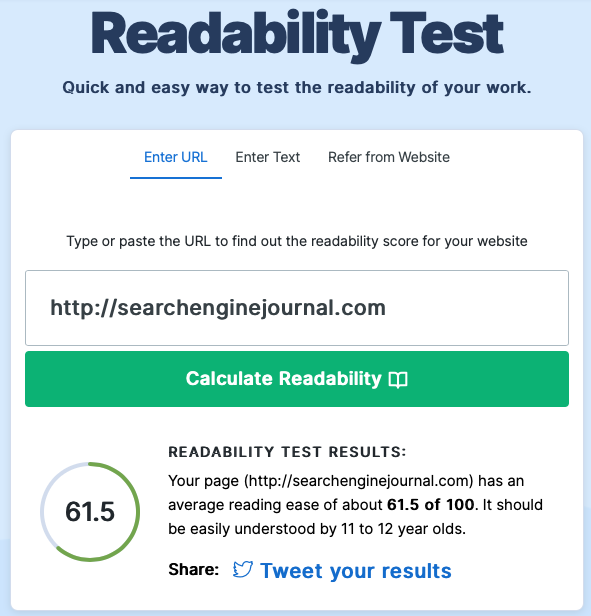 Screenshot from WebFX, August 2022
Screenshot from WebFX, August 2022This provides a quick overview of reading ease and the age group it can be understood by, as well as several scores for your text.
You get statistics on sentences, complex words, words per sentence, and average syllables per word.
Opinions vary about which readability standard is the most accurate, so WebFX gives you five choices.
In addition to Flesch-Kincaid, it also calculates your Gunning Fog score, the SMOG index, the Coleman-Liau index, and the Automated Readability index.
The WebFX Readability Test is free to use.
4. Datayze Readability Analyzer
The Datayze Readability Analyzer is a copy-and-paste means of checking content.
After entering your copy, you’ll get statistics on overall readability and scores using Flesh-Kincaid, Gunning Fog, SMOG, Dale-Chall, and Fry Readability.
It also offers paragraph-level analysis to help you identify how your readability changes throughout a document, an extraneous word finder, passive sentence detection, and a spell checker.
This online tool is free to use.
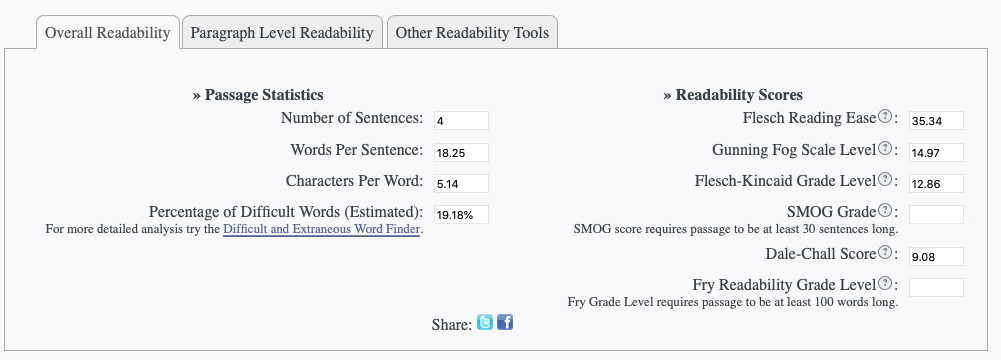 Screenshot from Datayze Readability Analyzer, August 2022
Screenshot from Datayze Readability Analyzer, August 20225. Hemingway App
Considered one of the greatest American writers, Ernest Hemingway was known for employing a straightforward approach to writing.
The Hemingway App honors Papa’s spirit and helps content writers streamline their work for increased clarity.
After entering your text, it provides a grade level score and highlights areas in which it could improve.
This includes identifying adverbs, passive constructions, phrases with simpler alternatives, and difficult-to-read sentences.
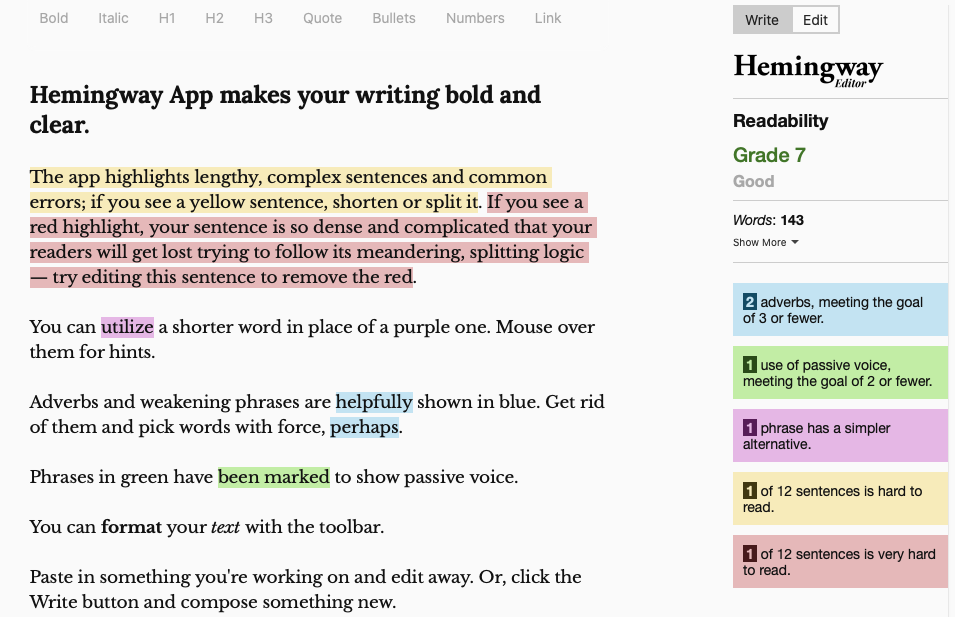 Screenshot from Hemmingway App, August 2022
Screenshot from Hemmingway App, August 2022You can use this tool online for free or download the desktop app for $19.99.
6. Grammarly Online Writing Assistant
Grammarly is an app, cloud-based tool, and browser extension for identifying content issues like grammar, spelling, conciseness, and tone.
Using artificial intelligence, it suggests alternatives to difficult-to-understand words and phrases. It also checks for plagiarism.
Grammarly has a basic free plan, as well as two subscription plans that offer more expansive help for writers.
7. ProWritingAid Writing Assistant
Another AI-powered tool for checking spelling, grammar, and readability, ProWritingAid Writing Assistant, has features designed to help you more accurately convey information.
It offers style suggestions and a contextual thesaurus, as well as 20 writing reports that identify everything from cliches and overused words to sentence length and consistency.
ProWritingAid also has browser extensions and integrates into several programs, including Word, Outlook, Google Docs, and Scrivener.
Pricing ranges from $20/month for a monthly subscription to a one-time $399 payment for lifetime access.
8. LanguageTool Writing Assistant
LanguageTool is a proofreading tool that checks for grammar and style mistakes. Available in 22 languages, it is available online, as an app or as a plugin.
It highlights writing issues in your content, helping you identify areas that could use improvement. It also gives you approximate reading time for a piece.
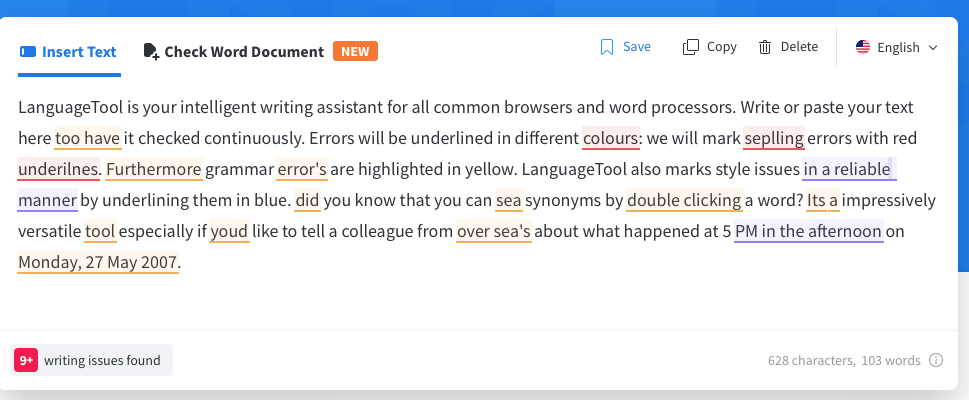 Screenshot from LanguageTool, August 2022
Screenshot from LanguageTool, August 2022The free version checks grammar, punctuation, and style.
Meanwhile, premium versions ($4.99/month for individuals or $9.48/month for teams of up to 20) provide suggestions for improving style and tone, as well as identifying incorrect names, titles, and numbers.
9. Ginger Writing Assistant
Ginger Writing Assistant uses artificial intelligence to identify and correct mistakes and improve the style of your copy. It suggests context-based corrections, including rephrasing alternatives. It can also offer synonyms, not just for single words but for entire phrases.
Ginger Writing Assistant is available as a browser plugin and desktop or mobile app. It also integrates directly into Microsoft Word.
Pricing ranges from $7.49/month for an annual plan to $13.99/month for monthly ones. Ginger also offers discounts for teachers and students, as well as customizable plans for organizations with more than 2000 users.
10. Yoast SEO Readability Analysis
A popular SEO plugin for WordPress, Yoast also includes a readability feature. Explicitly designed for search engine optimization, it checks your writing’s readability and highlights issues.
Your content’s readability is scored on a green-yellow-red scale, where green is good, yellow could be improved, and red needs work.
It checks for passive voice, transition words, subheading distribution, paragraph length, sentence length, and consecutive sentences. It provides your Flesch reading score, as well as allows you to analyze multiple keywords.
This feature is included in Yoast SEO premium, which costs $99/year.
11. Character Calculator Readability Scores
Character Calculator is an online tool for counting characters, words, sentences, and paragraphs. It also includes a Dale-Chall Readability Calculator to score your content.
Using this formula, it allows you to copy and paste text, which is then scored. Unlike Flesch-Kincaid, the lower your content scores on the Dale-Chall scale, the easier it is to read.
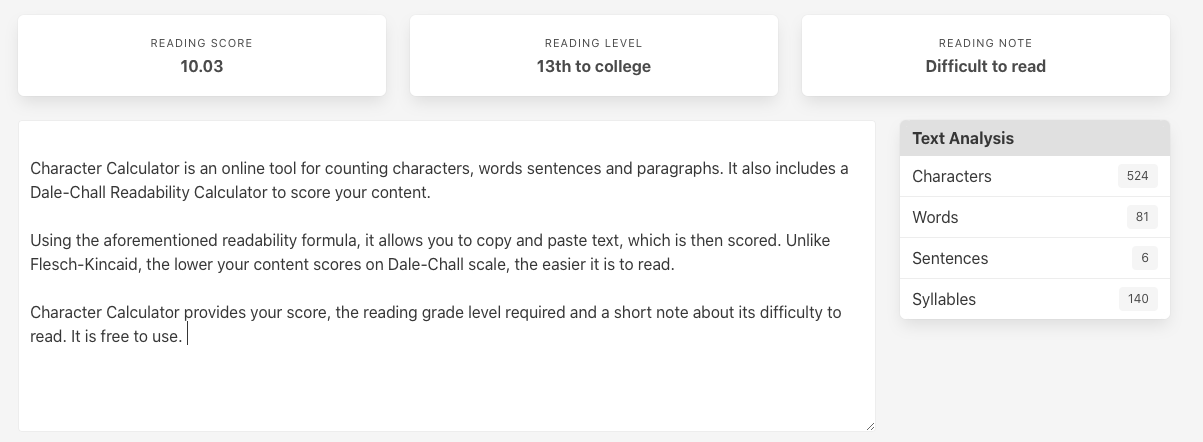 Screenshot from Character Calculator, August 2022
Screenshot from Character Calculator, August 2022Character Calculator provides your score, the reading grade level required, and a short note about reading difficulty. It is free to use.
12. Copywritely Readability Checker
Copywritely is content software designed for search engine optimizers. In addition to scoring your content’s readability, it also checks for SEO issues to help ensure your copy works for both humans and search engines.
The SEO features detect content problems that impact your search rankings and recommend rewriting, replacing, or deleting content as needed.
The readability checker uses the Flesch-Kincaid formula to help you identify and fix dense content.
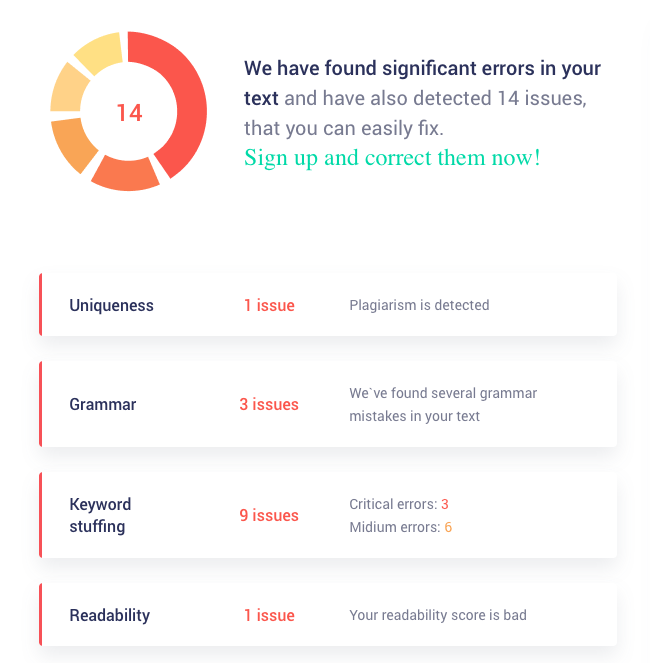 Screenshot from Copywritely, August 2022
Screenshot from Copywritely, August 2022The cost of Copywritely ranges from $18/month for individuals to $67/month for enterprise organizations.
13. Semrush Writing Assistant
Designed to help you optimize your content for both human readers and search engines, Semrush’s SEO Writing Assistant measures readability and consistency while checking for plagiarism.
It uses copy-and-paste or import from the web functionality to score your content and offer recommendations. You can select your target audience by country and region, all the way down to a city level, and specify desktop or mobile users.
You can specify keywords for comparison with competitor content and are presented with visual information on readability, SEO, originality, and tone.
The SEO Writing Assistant is included in Semrush, with plans ranging from $119.95/month to $449/95/month.
14. Searchmetrics Content Experience
Another tool for search engine optimization professionals, Searchmetrics Content Experience, uses machine learning to help identify which content is most relevant to your audience.
It provides real-time feedback on a copy as you type and scores your content based on factors like word count, sentence structure, keyword coverage, and repetition.
You can also compare your website with competitors and discover which keywords you can add to increase your ranking.
Searchmetrics offers custom pricing.
15. Link Assistant SEO Content Editor
Link Assistant SEO Content Editor is a comprehensive tool for website content. In addition to keyword tools, it provides insights into optimizing copy for search engines and lets you create and track tasks for your team.
You can also analyze competing websites or use its built-in tools to generate new content ideas. Content Editor lets you download SEO guidelines and write tips for pages while reporting keyword usage.
A limited free version is available, as well as a professional edition ($299/year) and an enterprise version ($499/year).
16. Review Tools Content Analysis
SEO Review offers 60 free search engine optimization tools, including Content Analysis. It allows you to enter primary and secondary keywords and offers suggestions for other keywords and SEO optimization.
Items including page title and meta description are scored using red and green. It measures keyword density, headers and subheads, links, and other factors that come into play in search engine optimization.
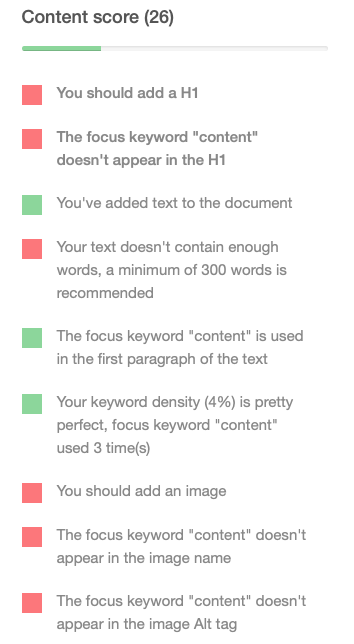 Screenshot from SEO Review Tools, August 2022
Screenshot from SEO Review Tools, August 2022Content Analysis is web-based and free to use.
Content Is Still King
Sometimes search engine professionals get so caught up in algorithms and keywords and metrics and forget the most important thing about any webpage: It should provide value for visitors.
And to do this, your content has to be easily digested. Good readability helps you attract attention to your site and communicate your message more effectively and drive action.
Making your webpages easier to read and understand helps keep your visitors engaged, which in turn helps your quality score with search engines.
But it’s hard to craft content that’s easy to read; even the most experienced writers struggle with it at times.
Luckily, all sorts of useful tools are available to help you punch up your copy, minimize confusion, and more accurately convey information, all of which will reap benefits for SEO.
More Resources:
Featured Image: Sharomka/Shutterstock
